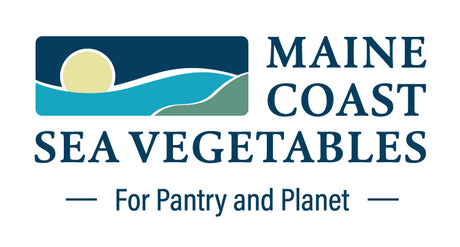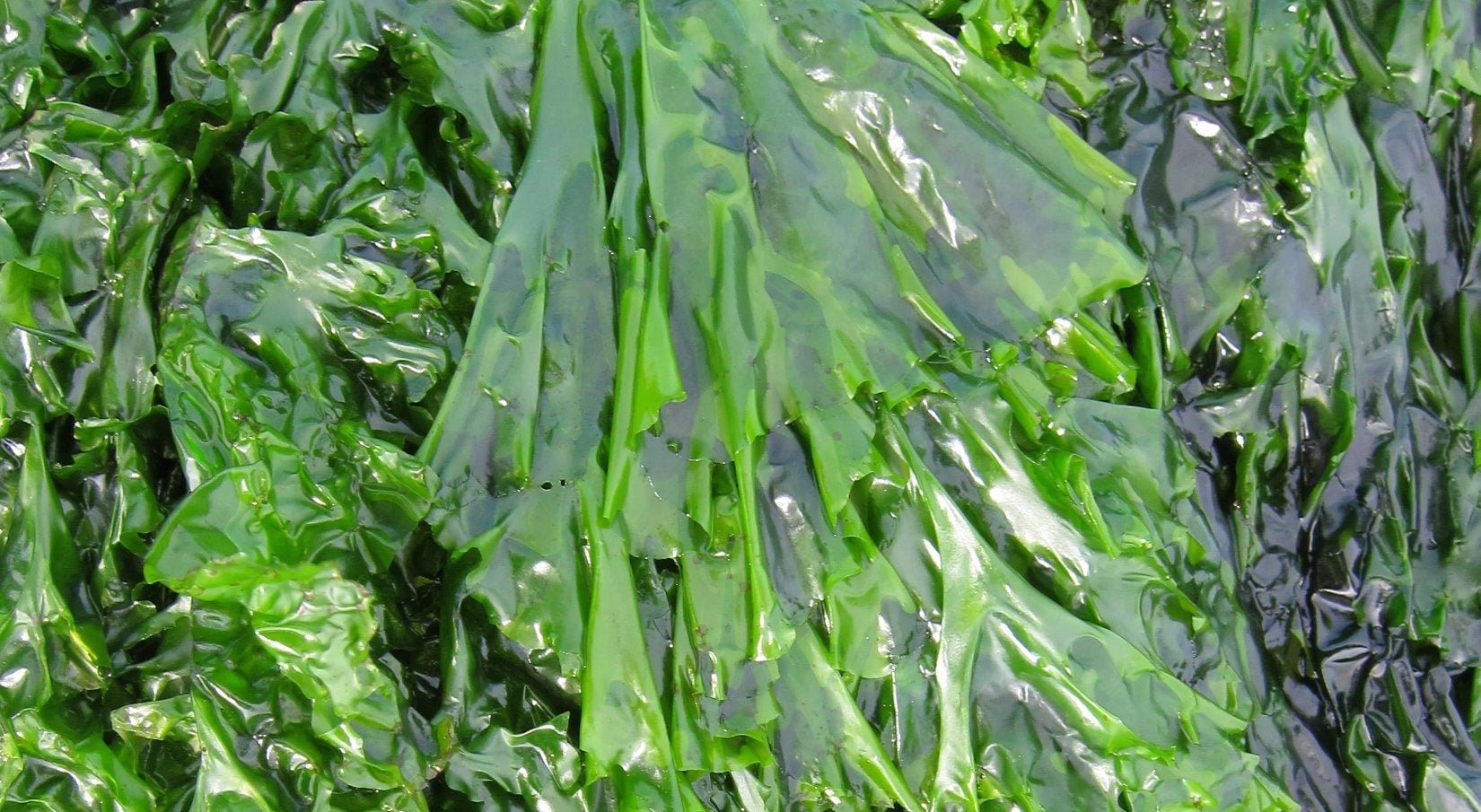What is vitamin B-12?
Vitamin B-12 is an essential nutrient that most Americans get from eating meat, fish, shellfish, and vitamin-fortified foods. It’s been known since the 1950’s that B-12 is also found in seaweed, but scientists have raised concerns about whether it comes in a form that can be metabolized by humans. However, better testing methodology is now adding evidence that seaweed B-12 can be used by humans and that it’s found in more species than originally thought, including sea lettuce. In this article, we take a deep dive into sea vegetables and vitamin B-12.
All animal life requires Vitamin B-12, AKA cobalamin, for red blood cell formation, nerve function, cell metabolism, and DNA synthesis. However, only some bacteria can synthesize it; all other life forms, including many bacteria unable to synthesize it on their own, must get cobalamin from bacteria that can. Land animals get B-12 from bacterial synthesis in their guts or rumens, or by eating other animals, and aquatic organisms get it through the planktonic food chain.
As in many other animals, some bacteria in the human intestine can synthesize B-12, but generally, not enough to meet our daily requirement. In part, this is because other gut bacteria that can't synthesize B-12 get it from the ones that can. In other words, a balanced human gut microbiota has bacteria that both can and cannot synthesize B-12, thus leaving little left over for the host.
In addition, humans absorb B-12 in the small intestine, specifically the ileum, whereas most bacterial synthesis occurs in the large intestine, which follows the small intestine. Ruminant animals such as cows or sheep produce it in the rumen before the small intestine. Coprophagic animals (animals that eat their own feces) such as rabbits or rodents (and some dogs, unfortunately!) absorb B-12 contained in feces. Humans, being neither ruminants nor coprophagous, must get B-12 from eating meat, seafood, or other foods that contain B-12. 
How much B-12 do we need?
We don’t need much. The U.S. recommended daily intake (RDI) of vitamin B-12 for adults is 2.4 micrograms (mcg), while the European Food Safety Authority recommends 4 mcg/day. Most people meet their RDI from eating meat, seafood, or fortified processed foods. However, since plants neither require nor synthesize B-12, vegetarians and vegans must take care to get it from other sources such as supplements, nutritional yeast, or vitamin fortified foods. Cobalamin can either be chemically synthesized or extracted from bacterial cultures to produce supplements. Many supplements on the market today provide huge doses of 1,000 mcg, but most of that is excreted when taken at once, though the liver does store some excess. The body more efficiently absorbs cobalamin in small doses throughout the day rather than in one large dose once per day. Taking a ten-mcg supplement once per day or consuming 1-2 mcg on three occasions throughout the day both provide about 2-4 mcg of useable B-12.
Symptoms of B-12 deficiency include anemia, fatigue, muscle weakness, intestinal problems, nerve damage, tremors, and mood imbalances. The most reliable test for B-12 status is MMA (Methylmalonic Acid) testing, which can be done on blood or urine. Elevated levels (>370 nmol/L MMA in blood or >4mcg/mg creatinine in urine) are indicative of B-12 deficiency. Symptoms may develop gradually over several months or even take up to five years to develop depending on the degree of deficiency. Short-term deficiency in adults can usually be reversed with no lasting harm once the deficiency is addressed. Prolonged deficiency can lead to permanent neurological damage, while infants can suffer permanent damage or even death from just short-term B-12 deficiency. Although rare, this can occur in malnourished infants or in breastfed infants of vegan mothers whose own B-12 status is low. Adults older than 50 years may also be at risk of deficiency because about 10 to 30 percent of older adults are less efficient at absorbing natural B-12 from food.
Cobalamin & seaweed
Cobalamin is a structurally complex molecule and it is the only vitamin to contain a metal ion, cobalt, from which it gets its name. Described as “nature’s most beautiful co-factor,” it was first characterized at the molecular level in 1948 by Dorothy Hodgkins and co-workers (Hodgkins won the Nobel Prize for her discovery). Shortly thereafter in 1953, Japanese scientists found vitamin B-12 in nori seaweed; in some cases, at higher levels than in meat. This finding generated much excitement at the possibility that seaweed could be a major non-animal source of B-12, and vegetarians and vegans were quick to embrace it. Although many of them already ate sea vegetables anyways, the fact that it contained B-12 gave them all the more reason.
However, subsequent research cast doubt on the notion that seaweed could be a good source of B-12 for humans. A study published in 1991 found that vitamin B-12 from algae appeared not to be bioavailable. In that study, parents of children on macrobiotic diets with vitamin B-12 deficiency were advised to provide nori and spirulina to the kids. The researchers fully expected that this would resolve their symptoms of B-12 deficiency, mainly, problems with their red blood cells. Instead, to their surprise deficiency symptoms persisted, even though the researchers were able to measure increased B-12 concentrations in the children’s blood plasma. By comparison, children who received B-12 from eating fish did improve. These and similar findings from other studies led nutrition experts to advise that vegetarians, vegans, and others not rely upon seaweed as their sole source of vitamin B-12, despite studies that continued to show its presence. The Vegan Society has some good information on this topic, and Maine Coast Sea Vegetables has followed the same advice for many years.
The reasons for uncertainty regarding B-12 in seaweed lie in both its complex structure and the test methods used to quantify it. Vitamin B-12 is just one of a group of molecules known as corrinoids, many of which structurally resemble cobalamin but differ in crucial respects. These similar molecules are known as B-12 analogues or as pseudo-vitamin B-12. Although they may serve as corrinoid vitamins for simpler life forms such as algae and bacteria, they are not a vitamin for humans and some of them may actually interfere with B-12 metabolism.

Testing seaweed for cobalamin
The most common B-12 test method used by commercial labs and many research scientists, especially in the early years, is a microbiological assay. This assay examines the growth of certain bacteria, usually Lactobacillus leichmannii, that require B-12 for survival but can’t make it themselves. Their growth in media containing the test sample is compared to their growth in media with known concentrations of B-12, which leads to then being able to calculate B-12 concentrations in the test sample. However, when this test was first developed it wasn’t fully appreciated that these bacteria could also use B-12 analogues to grow.
Most foods tend to contain true B-12 and not pseudo-B-12, so this shortcoming isn’t usually an issue, but it is with seaweed. Once again, we find that test methods developed for most other foods don't work as well with seaweed. In this case, the symbiotic bacteria that synthesize B-12 in seaweed are often perfectly fine using B-12 corrinoid analogues, so in many cases, they produce pseudo B-12 and not the form that humans can use. Scientists evaluating seaweed with the microbiological assay may thus draw the faulty conclusion that it’s a good source of bioavailable B-12. However, in 1986, scientists showed that many of the corrinoid compounds detected in seaweed were actually B-12 analogues. One research paper even went so far as to suggest that not only was seaweed not a good source of B-12, but that eating large amounts could negatively impact B-12 metabolism.
Sea lettuce and vitamin B-12
Modern test methods can now more effectively differentiate between pseudo B-12 and true B-12. Results from recent studies using these more sensitive tests have revived hopes that seaweed can be an important source of dietary B-12. What’s more, these studies propose a surprising new candidate for this purpose: sea lettuce (Ulva).
Many earlier studies had focused on B-12 content in nori (Pyropia) and related laver (Porphyra) species because the initial discovery in 1953 was in nori. In the past two decades, however, scientists have tested for it in a wide range of macroalgae and found that about half of all species contain true B-12 along with varying proportions of analogues. A study published in 2023 looked at B-12 content in twenty UK seaweed species using a combination of the traditional microbiological assay and a more sophisticated method known as UPLC-MS/MS. They found substantial levels of true B-12 in laver, dulse, sea lettuce, and alaria, with sea lettuce and laver containing more than the other species and having a similar average content to one another of about 0.3mcg/g. In theory, this means consuming eight grams of either species would meet the B-12 RDI of 2.4mcg.

Sea lettuce flakes add flavor and nutrition to all sorts of foods
Of course, this is just one study, but a more recent 2024 study done in Sweden using UHPLC-UV-MS/MS analysis found that Ulva contained on average 0.68 mcg/g B-12; enough to qualify it for the EU nutritional claim “High in Vitamin B12.” However, the authors concluded that “bioavailability trials are necessary to determine the extent to which vitamin B12 from these products is absorbed and reaches systemic circulation.”
This is a crucially important distinction. Demonstrating bioavailability is the gold standard for knowing whether the presence of a nutrient in a particular food translates to it being taken up and metabolized for benefit by the body. Just because a nutrient is present doesn’t mean it is bioavailable to humans. Unfortunately, human bioavailability studies are challenging and costly to conduct, and so far, no researchers have taken on the challenge of evaluating seaweed B-12 bioavailability.
Are sea vegetables a good source of B-12?
What does this mean for our vegetarian, vegan, and macrobiotic customers who want to get B-12 from their diet alone while avoiding supplements and processed fortified foods? Sadly, we don’t advise tossing your supplements just yet, but happily, we do advise including sea vegetables in your diet! The risks associated with B-12 deficiency are simply too high to rely on seaweed alone as a source, but the evidence does seem to get stronger every year that consuming sea vegetables, especially sea lettuce and laver, can meaningfully contribute to vitamin B-12 intake.
Including sea vegetables in your diet is simply a good strategy to cover all your nutritional bases, so to speak. In addition to potentially being a good source of cobalamin, sea vegetables contain a wide range of minerals, bioactive polysaccharides, and other nutrients that all contribute to well-being.
Now, we know from long experience that some customers will want to know how much sea lettuce, laver, or dulse they should eat to get the proper amount of vitamin B-12. However, that question is impossible to answer! For one thing, some people absorb B-12 less efficiently than others, and thus need to get more in their diet. Also, we don’t test our sea vegetables for cobalamin, in small part because most commercial labs use the unreliable microbiological assay, but in larger part because vitamin B-12 content can vary a lot depending on the age of the plant, season, microbial community, and other factors. Because our sea vegetables are sustainably wildcrafted over several months, testing every batch would simply be too time consuming and costly.
So instead, we’ll just offer some simple advice. Eat sea vegetables every day. Eat them in small quantities 2-3 times per day (B-12 is more efficiently absorbed that way). Finally, try to eat one from each color group (brown, red, and green) to get the unique benefits each one offers. As our only green species, sea lettuce is sure to always be part of the equation!

